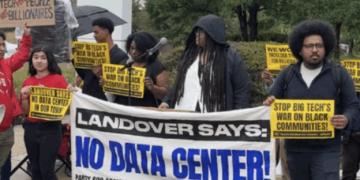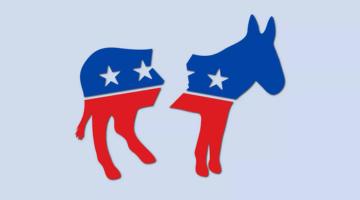The Kamala Harris campaign for the 2024 presidential election was a display of the democratic party's willingness to abandon the most loyal segment of their base to remain fully committed to their strategy of appealing to the conservative politics and racism of the right.
Anyone hoping to perform an autopsy on Donald Trump’s landslide victory should not begin with a dissection of Kamala Harris shambolic presidential bid but with an exhumation of two separate campaign events that happened in the final years of the 20th century.
The first was an August 3, 1980 rally held by the Republicans’ presidential nominee, Ronald Reagan, at the Neshoba County State Fair in Philadelphia, Mississippi, not far from where the bodies of three civil rights workers-- James Chaney, Michael Schwerner and Andrew Goodman—were found buried in an earthen dam 16 years earlier.
The dramatic disappearance of Chaney, an African American, and Schwerner and Goodman--both Jewish New Yorkers—occurred during Mississippi Freedom Summer, a landmark campaign organized by the Student Nonviolent Coordinating Committee, or SNCC, to democratize the Deep South. The ensuing six-week-search for their bodies and subsequent revelation that they had been murdered by the Ku Klux Klan represented one of the defining moments of the civil rights era, leading to the passage of the Voting Rights Act the following year, and forming the basis for the movie, Mississippi Burning, in 1989.
With only six votes in the Electoral College, Reagan seized on the symbolism of Neshoba County to pivot sharply right after winning his party’s nomination. Doubling down on Richard Nixon’s Southern Strategy, Reagan used the divisive language of “state’s rights,” and later “Cadillac-driving welfare queens” to appeal to a white working class that had begun to collaborate with their African American coworkers during Franklin D. Roosevelt’s New Deal administration. While tenuous, the militant, interracial coalition had, by the early 1950s, managed to create the wealthiest and most densely populated middle class in the history of the world, with wages accounting for more than half of the nation’s Gross Domestic Product.
Imports from Japan and Western Europe combined with rising oil prices to eat into the Golden Age of American industrialism however, causing meat prices to soar and competition for jobs to intensify as the nation’s bicentennial approached. Sensing an opportunity to bring whites back “home” Reagan wielded racially loaded rhetoric the way that a butcher wields a meat cleaver, using it to hack away at the liberal consensus that had tipped the balance of political power in labor’s favor, if only slightly.
And yet, if Reagan’s landslide victory in the 1980 presidential election ushered in a conservative political epoch that is deeply rooted in anti-Black racism, it was Bill Clinton who closed the deal 12 years later when he appeared just before the 1992 Super Tuesday primaries at the Stone Mountain Correctional Institution alongside Georgia Governor Zell Miller, U.S. Senator Sam Nunn, and Congressman Ben Jones—a former actor who played “Cooter” on the television show Dukes of Hazzard—for “a press conference of little apparent purpose except to show them standing in front of a phalanx of dour jump-suited inmates, all but a sprinkling of whom were Black,” as the writer Nathan Robinson described it.
Responding to the newspaper photographs of the event, Clinton’s rivals for the Democratic party’s nomination were quick to denounce the Arkansas governor. California Governor Jerry Brown compared Clinton and his mates to “colonial masters” soothing white settler fears of a rumored slave revolt or an attack by a Native American tribe. “Don’t worry, we’ll keep them in their place. ... Two white men and forty Black prisoners, what’s he saying? He’s saying we got ’em under control, folks.”
Publicly, Clinton decried his critics’ racial politicking. His intent, he protested, was merely to help rehabilitate youths who had lost their way. Privately, however, Slick Willy must’ve been over the moon that his rivals were helping him make his case to white, blue-collar voters--especially those who had defected to the GOP—that he planned to be every bit as hard on African Americans as was Reagan.
By 1992, the Democrats hadn’t won the White House in 16 years and two dueling ideologies were vying for the soul of the party. Advancing from the left was Jesse Jackson, whose 1984 and 1988 presidential campaigns consciously parroted Harold Washington’s 1983 election as Chicago’s first African American mayor, and had some success in wooing Black and white workers with progressive platforms that included a single-payer healthcare system that continues to elude the U.S. to this day.
Often described by newspaper columnists as a man of both great intellect and rapacious appetites, the Ivy League-educated Clinton’s real genius was reheating old ideas and repackaging them as his own. In aping Reagan’s 1980 Neshoba County campaign stop, the unimaginative Clinton locked the Democratic Party into an electoral strategy predicated on Black suffering.
Lacking both the intellectual resources and moral courage to reinvent the Democratic Party, Harris merely read from the script handed down to her by Bill Clinton. Rather than focus her campaign on issues that might’ve turned out both African American and independent voters —Medicare 4-All, repealing qualified immunity for abusive police officers, a nationwide public works program, a $15-an-hour federal minimum wage, reparations or an arms embargo for Israel—Harris campaigned as a conservative, representing Mitt Romney’s wing of the Republican party, appearing with former congresswoman Liz Cheney, denouncing Russian President Vladimir Putin and promising to transform the U.S. military into the “most lethal” fighting force in the world.
Nonplussed, African American voters stayed home on Election Day.
Compounding matters was that Joe Biden won the White House in 2020 by pledging to address police brutality against Black people in the season of protests that followed the murder of a Black man, George Floyd, by a Minneapolis police officer. No sooner had he been elected, however, than he began to back away from campaign promises made to the party’s Black constituents.
Similarly, African Americans lost more wealth during Barack Obama’s eight years in the White House than at any time since the collapse of the Freedmen’s Bank in 1874. That was due almost entirely to Obama’s handling of the subprime real estate bubble that burst in 2008. Policymakers have historically responded to debt crises by forcing big creditors to accept a reduction or “haircut” on their loan portfolios to reduce borrowers’ monthly installments and free up consumer cash for new spending.
Additionally, government regulators traditionally indict, prosecute and ultimately jail lenders for fraud to discourage repeated wrongdoing, or “moral hazard.” During the savings and loan crisis, for example, the Department of Justice, under Reagan and George H.W. Bush, jailed hundreds of bank executives, including Charles Keating, whose Lincoln Savings and Loan scandal cost taxpayers $3.4 billion.
Lehman Brothers’ 2008 collapse cost taxpayers nearly 10 times that amount, and yet the Obama administration did not prosecute a single Wall Street executive for malfeasance. Nor did Obama give Wall Street’s grifters a haircut. In fact, he did quite the opposite, bailing out everyone except the disproportionately Black borrowers who were swindled out of their homes and life savings, by purchasing bad debts from unscrupulous lenders for 100 cents on the dollar, repaying the investors who purchased the liars’ loans, and showering the big banks and corporations with trillions in cheap money in a bid to re-inflate the speculative bubble and send the stock market soaring again.
It was hardly a coincidence that Latinos and African Americans (“mud people” as some loan officers referred to them) were left holding the bag.
Like Hillary Clinton, Harris seemed tone deaf, dismissing any suggestion that she pursue race-specific policies, and squandering virtually every opportunity to turn out the Black vote. When the state of Missouri executed an African American man, Marcellus Williams, without any forensic evidence that he was responsible for the 1998 murder of a white St. Louis woman, Harris refused to use her bully pulpit merely to urge state officials to reconsider, or retry the case.
The irony is that while the Democrats have hewed tightly to anti-Black positions, Trump has made some small gestures towards African Americans.
In 2021 Democrats passed the American Rescue Plan which included $4 billion of debt forgiveness for Black and other “socially disadvantaged” farmers, a group that has endured decades of discrimination from banks and the federal government. The agency sent out letters to approximately 16,000 farmers around the country renewing hope that financial relief was imminent.
In a 2022 article, the New York Times wrote:
One of those letters was sent to Paul Copeland, a farmer in Shiloh, Ga., who received an official notice in 2021 that the loan on his property would be forgiven. Mr. Copeland, who has about $150,000 left to repay, said he planned to invest in his ranch, where he raises about 70 cows that he sells for beef, once that financial burden was lifted.
But the promise of the debt relief program was dashed after groups representing white farmers filed lawsuits to block it, arguing that the federal government was engaging in reverse discrimination by awarding money based on race. The lawsuits were initiated by America First Legal, an organization led by Stephen Miller, a former top Trump administration official. The Department of Justice ultimately declined to appeal a court ruling that blocked the program from going into effect.
Mr. Copeland, 65, has kept the letter. ‘It’s a reminder of what I could have done, a reminder of a promise not fulfilled,’ he said.
Later in the article, the Times wrote of John Boyd Jr., the president of the National Black Farmers Association:
The lack of progress has convinced Mr. Boyd that he cannot support Mr. Biden’s re-election bid. While he did not say that he was ready to back Mr. Trump, he suggested that the Trump administration had worked harder to help white farmers than Mr. Biden had for Black farmers.
‘Those farmers who have Trump signs in their yard, Trump made sure they got some happy checks,’Mr. Boyd said, referring to more than $20 billion in payments that Mr. Trump made to compensate farmers for lost sales as a result of his trade war.
A federal watchdog report showed that most of the aid went to large farms, which are predominantly white-owned.
‘Here I am fighting with an administration that should be embracing our population,’ said Mr. Boyd, who did receive a few thousand dollars of aid money during the Trump administration.
With Harris’ defeat, the Democrats have exhausted a 32-year-old election strategy of lynching the voting bloc upon whom the party depends for victory at the ballot box. And as in 1992, the party is faced with a clear choice: it can continue to punch down on African Americans, or it can win the White House, but it cannot do both.
Jon Jeter is a former foreign correspondent for the Washington Post, Jon Jeter is the author of Flat Broke in the Free Market: How Globalization Fleeced Working People and the co-author of A Day Late and a Dollar Short: Dark Days and Bright Nights in Obama's Postracial America. His work can be found on Patreon as well as Black Republic Media.



















